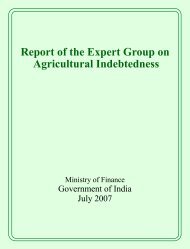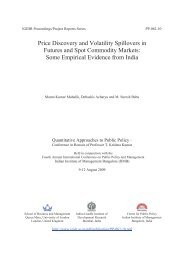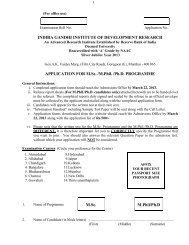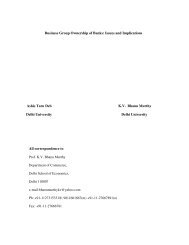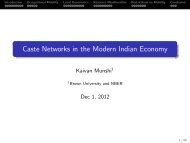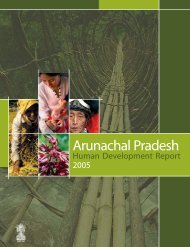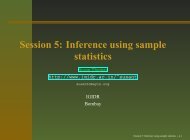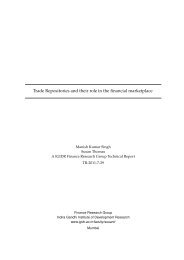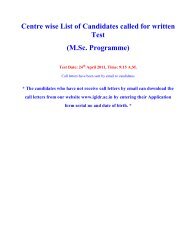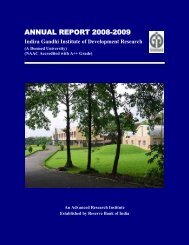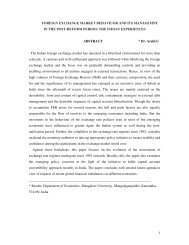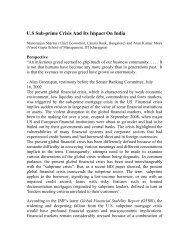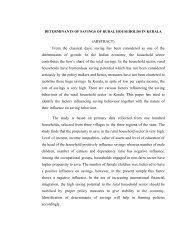Kerala 2005 - of Planning Commission
Kerala 2005 - of Planning Commission
Kerala 2005 - of Planning Commission
You also want an ePaper? Increase the reach of your titles
YUMPU automatically turns print PDFs into web optimized ePapers that Google loves.
14<br />
2.2.5 The Post-Independence Period<br />
The substantial freedom in the social and economic<br />
spheres that followed the political freedom comprised a<br />
series <strong>of</strong> turning points. Radical land reforms in the 1960s<br />
were a landmark in the development history <strong>of</strong> <strong>Kerala</strong>.<br />
It bestowed a measure <strong>of</strong> economic freedom upon the<br />
large mass <strong>of</strong> agricultural labour households through<br />
land redistribution, conferment <strong>of</strong> ownership rights to<br />
hutment dwellers, creation <strong>of</strong> colonies for members <strong>of</strong><br />
the Scheduled Castes (SC) and Scheduled Tribes (ST),<br />
with lands, buildings, and facilities. Equally radical was<br />
the <strong>Kerala</strong> Agricultural Workers Act (1974), hailed as<br />
the Magna Carta <strong>of</strong> agricultural labourers in the State. It<br />
prescribed hours <strong>of</strong> work, security <strong>of</strong> employment, higher<br />
minimum wages and welfare provisions. It heralded<br />
wage inflation in <strong>Kerala</strong> that contributed to a rise in living<br />
standards but also, among other factors, to the decline <strong>of</strong><br />
the highly labour-intensive rice cultivation.<br />
Yet another landmark was the vast network <strong>of</strong> public<br />
distribution <strong>of</strong> food. It increased people’s access to<br />
foodgrains and other items <strong>of</strong> daily consumption, such as<br />
sugar, edible oil and kerosene, by subsidising the difference<br />
between the market and the issue prices through fair price<br />
shops. At another level was the public distribution <strong>of</strong> food<br />
in <strong>Kerala</strong> through the school-feeding programme (discussed<br />
in greater detail later).<br />
An expanding network <strong>of</strong> social security and welfare<br />
measures, such as pension schemes (for agricultural<br />
workers, widows, destitute, old age and the physically<br />
handicapped) and welfare funds (for informal sector<br />
workers), taken up over time under populism and<br />
organised public demand also ensured enhancing <strong>of</strong><br />
economic freedom.<br />
<strong>of</strong> newspapers in the language <strong>of</strong> the people, Malayalam.<br />
A number <strong>of</strong> voluntary organisations also emerged, consciously<br />
and conspicuously imparting scientific and rational awareness<br />
among the masses.<br />
All these had a favourable impact on the health front also.<br />
<strong>Kerala</strong> attained high health status in respect <strong>of</strong> all standard<br />
indicators <strong>of</strong> maternal, infant and child health as well as <strong>of</strong><br />
the general health <strong>of</strong> the people, on par with those <strong>of</strong> many<br />
developed nations, due to a vast health care infrastructure<br />
facilitating access to institutional care. The network <strong>of</strong> primary<br />
and community health centres extended their services to the<br />
remotest <strong>of</strong> rural areas in the State.<br />
Behind all these improvements was an ever-growing<br />
public demand. But the initial immediate causes such as<br />
the lure <strong>of</strong> a secured job and the associated opportunities<br />
were not sustainable themselves. It should be noted that<br />
agency well being is a function not only <strong>of</strong> the capability<br />
to function but also <strong>of</strong> its translation into achieved<br />
functioning. Otherwise, discontent and frustration set<br />
in. Thus, enhancing social development presupposes<br />
expanding economic opportunities. However, given the<br />
regional character <strong>of</strong> the <strong>Kerala</strong> economy, the capabilitybuilding<br />
development process could not lead to<br />
enhancing opportunities in the productive sectors <strong>of</strong> the<br />
economy. It created and accumulated a large reserve <strong>of</strong><br />
human resources much in excess <strong>of</strong> physical capital, thus<br />
giving rise to the socially frustrating outcome <strong>of</strong> educated<br />
unemployment. <strong>Kerala</strong> thus was not able to translate its<br />
greater freedom into actual achievement.<br />
Nevertheless, the social development achievements<br />
implied a positive outcome <strong>of</strong> a fast demographic transition,<br />
The aspirations <strong>of</strong> a new generation free from ignorance<br />
and ill health resulted, through public demand and supply,<br />
in wider access to education and health care. Even by 1971,<br />
a little over 60 per cent <strong>of</strong> <strong>Kerala</strong>’s population was literate,<br />
as against 29 per cent for all-India, 10 and <strong>Kerala</strong> always led<br />
all other States in per capita expenditure on education. 11 In<br />
the 1950s, education claimed 35.6 per cent <strong>of</strong> the total State<br />
Government expenditure, rising to 39.7 per cent in the 1970s. 12<br />
<strong>Kerala</strong> was again fortunate in that the literary movement<br />
helped develop a non-formal education system with a wide<br />
network <strong>of</strong> libraries and reading rooms, and a large number<br />
10 Panikar and Soman, 1984: 60.<br />
11 Menon, 2000: 285.<br />
12 Panikar and Soman, 1984: 61.



